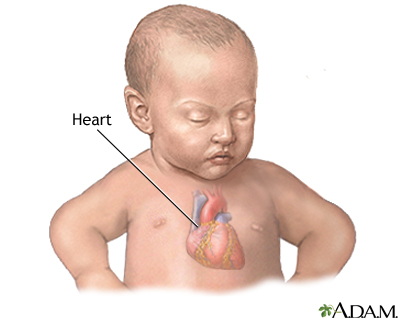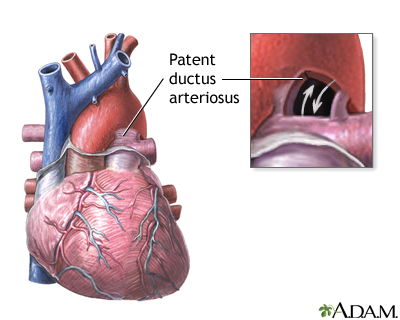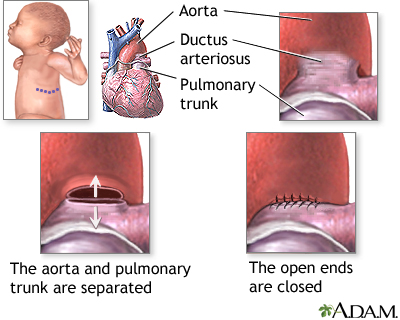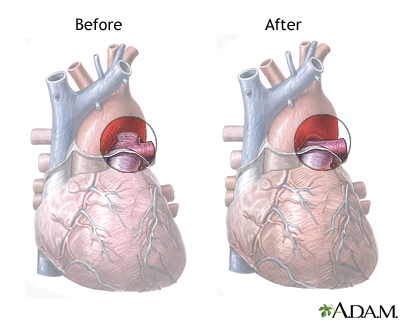Health Library
Patent ductus arteriosis (PDA) - series

Normal Anatomy
The heart pumps blood throughout the body. It is located in the thorax.

Indications
The type and timing of surgical repair depends on the child's condition and the type and severity of heart defects.
In general, symptoms that indicate that surgery is needed are:
- Difficulty breathing because the lungs are wet, congested, or fluid-filled (congestive heart failure)
- Problems with heart rate or rhythm (arrhythmias)
- Excessive work load on heart that interferes with breathing, feeding, or sleeping

Procedure
An incision may be made through the breastbone (sternum) and between the lungs (mediastinum) while the child is deep asleep and pain-free (under general anesthesia). For some heart defect repairs, the incision is made on the side of the chest, between the ribs (thoracotomy) instead of through the breastbone. Heart lung bypass is used to support the child during the procedure. Tubes are used to re-route the blood through a special pump that adds oxygen to the blood and keeps it warm and moving through the rest of the body while the repair is being done.

Aftercare
Most children need to stay in the Intensive Care Unit for 3 to 7 days and stay in the hospital for 5 to 14 days. By the time the child is transferred out of the intensive care unit, most of the tubes and wires have been removed and they are encouraged to resume many of their daily activities. At the time of discharge, the parents are instructed on activity, how to care for the incision and how to give medications their child may need to take such as Digoxin, Lasix, Aldactone and Coumadin. The child needs at least several more weeks at home to recover.
Related Information
Congenital heart defect - corrective surgeryPatent ductus arteriosus
Congenital heart disease
BACK TO TOP
Review Date: 2/23/2022
Reviewed By: Thomas S. Metkus, MD, Assistant Professor of Medicine and Surgery, Johns Hopkins University School of Medicine, Baltimore, MD. Also reviewed by David Zieve, MD, MHA, Medical Director, Brenda Conaway, Editorial Director, and the A.D.A.M. Editorial team.
 | A.D.A.M., Inc. is accredited by URAC, for Health Content Provider (www.urac.org). URAC's accreditation program is an independent audit to verify that A.D.A.M. follows rigorous standards of quality and accountability. A.D.A.M. is among the first to achieve this important distinction for online health information and services. Learn more about A.D.A.M.'s editorial policy, editorial process and privacy policy. A.D.A.M. is also a founding member of Hi-Ethics. This site complies with the HONcode standard for trustworthy health information: verify here. |
The information provided herein should not be used during any medical emergency or for the diagnosis or treatment of any medical condition. A licensed medical professional should be consulted for diagnosis and treatment of any and all medical conditions. Links to other sites are provided for information only -- they do not constitute endorsements of those other sites. © 1997- 2022 A.D.A.M., a business unit of Ebix, Inc. Any duplication or distribution of the information contained herein is strictly prohibited.
